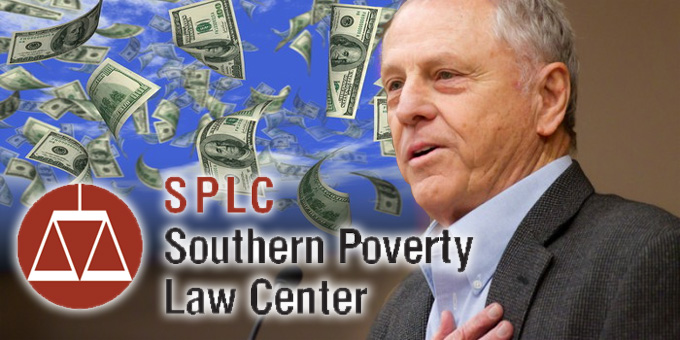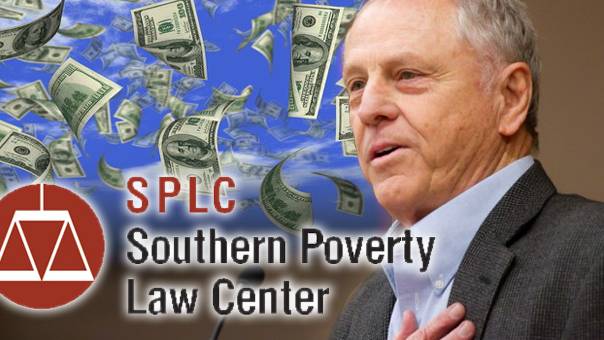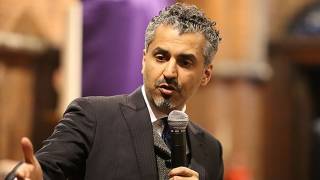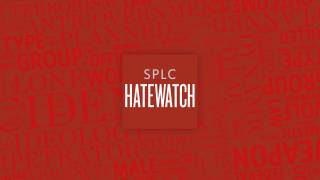The Church of Morris Dees - Southern Poverty Law Center Profit Driven Background
Source: americanpatrol.com
Originally from Harper’s Magazine, November 2000
Ah, tolerance. Who could be against something so virtuous? And who could object to the Southern Poverty Law Center, the Montgomery, Alabama-based group that recently sent out this heartwarming yet mildly terrifying appeal to raise money for its "Teaching Tolerance" program, which prepares educational kits for schoolteachers? Cofounded in 1971 by civil rights lawyer cum direct-marketing millionaire Morris Dees, a leading critic of "hate groups" and a man so beatific that he was the subject of a made-for-TV movie, the SPLC spent much of its early years defending prisoners who faced the death penalty and suing to desegregate all-white institutions like Alabama’s highway patrol. That was then.
Today, the SPLC spends most of its time--and money--on a relentless fund-raising campaign, peddling memberships in the church of tolerance with all the zeal of a circuit rider passing the collection plate. "He’s the Jim and Tammy Faye Bakker of the civil rights movement," renowned anti- death-penalty lawyer Millard Farmer says of Dees, his former associate, "though I don!t mean to malign Jim and Tammy Faye." The Center earned $44 million last year alone--$27 million from fund-raising and $17 million from stocks and other investments--but spent only $13 million on civil rights program , making it one of the most profitable charities in the country.
The Ku Klux Klan, the SPLC’s most lucrative nemesis, has shrunk from 4 million members in the 1920s to an estimated 2,000 today, as many as 10 percent of whom are thought to be FBI informants
In 1987, Dees won a $7 million judgment against the United Klans of America on behalf of Beulah Mae Donald, whose son was lynched by two Klansmen. The UKA’s total assets amounted to a warehouse whose sale netted Mrs. Donald $51,875. According to a groundbreaking series of newspaper stories in the Montgomery Advertiser, the SPLC, meanwhile, made $9 million from fund-raising solicitations featuring the case, including one containing a photo of Michael Donald’s corpse.
Horrifying as such incidents are, hate groups commit almost no violence. More than 95 percent of all "hate crimes," including most of the incidents SPLC letters cite (bombings, church burnings, school shootings), are perpetrated by "lone wolves." Even Timothy McVeigh, subject of one of the most extensive investigations in the FB’s history-and one of the most extensive direct-mail campaigns in the SPLC’s-was never credibly linked to any militia organization.
No faith healing or infomercial would be complete without a moving testimonial. The student from whose tears this white schoolteacher learned her lesson is identified only as a child of color. "Which race," we are assured, "does not matter." Nor apparently does the specific nature of "the racist acts directed at him," nor the race of his schoolyard tormentors. All that matters, in fact, is the race of the teacher and those expiating tears. "I wept with him, feeling for once, the depth of his hurt," she confides. "His tears washed away the film that had distorted my white perspective of the world." Scales fallen from her eyes, what action does this schoolteacher propose? What Gandhi-like disobedience will she undertake in order to "reach real peace in the world"? She doesn’t say but instead speaks vaguely of acting out against "the pain." In the age of Oprah and Clinton, empathy--or the confession thereof--is an end in itself.
Any good salesman knows that a products "value" is a highly mutable quality with little relation to actual worth, and Morris Dees-who made millions hawking, by direct mail, such humble commodities as birthday cakes, cookbooks (including Favorite Recipes of American Home Economics Teachers), tractor seat cushions, rat poison, and, in exchange for a mailing list containing 700,000 names, presidential candidate George McGovern-is nothing if not a good salesman. So good in fact that in 1998 the Direct Marketing Association inducted him into its Hall of Fame. "I learned everything I know about hustling from the Baptist Church," Dees has said. "Spending Sundays on those hard benches listening to the preacher pitch salvation-why, it was like getting a Ph.D. in selling." Here, Dr. Dees (the letter’s nominal author) masterfully transforms, with a mere flourish of hyperbole, an education kit available "at cost" for $30 on the SPLC website into "a $325 value."
This is one of the only places in this letter where specific races are mentioned. Elsewhere, Dees and his copywriters, deploying an arsenal of passive verbs and vague abstractions, have sanitized the usually divisive issue of race of its more disturbing elements-such as angry black people-and for good reason: most SPLC donors are white. Thus, instead of concrete civil rights issues like housing discrimination and racial profiling, we get "communities seething with racial violence." Instead of racially biased federal sentencing laws, or the disparity between poor predominantly black schools and affluent white ones, or the violence against illegals along the Mexican border, the SPLC gives us "intolerance against those who are different," turning bigotry into a color-blind, equal-opportunity sin. It’s reassuring to know that "Caucasians" are no more and no less guilty of this sin than African Americans, Asian Americans, Native Americans, and Hispanics. In the eyes of Morris Dees, we’re all sinners, all victims, and all potential contributors.
Morris Dees doesn’t need your financial support. The SPLC is already the wealthiest civil rights group in America, though this letter quite naturally omits that fact. Other solicitations have been more flagrantly misleading. One pitch, sent out in 1995-when the Center had more than $60 million in reserves-informed would-be donors that the "strain on our current operating budget is the greatest in our 25-year history." Back in 1978, when the Center had less than $10 million, Dees promised that his organization would quit fund-raising and live off interest as soon as its endowment hit $55 million. But as it approached that figure, the SPLC upped the bar to $100 million, a sum that, one 1989 newsletter promised, would allow the Center "to cease the costly and often unreliable task of fund raising. " Today, the SPLC’s treasury bulges with $120 million, and it spends twice as much on fund-raising-$5.76 million last year-as it does on legal services for victims of civil rights abuses. The American Institute of Philanthropy gives the Center one of the worst ratings of any group it monitors, estimating that the SPLC could operate for 4.6 years without making another tax-exempt nickel from its investments or raising another tax-deductible cent from well-meaning "people like you."
The SPLC’s "other important work justice" consists mainly in spying on private citizens who belong to "hate groups," sharing its files with law-enforcement agencies, and suing the most prominent of these groups for crimes committed independently by their members-a practice that, however seemingly justified, should give civil libertarians pause. The legal strategy employed by Dees could have put the Black Panther Party out of business or bankrupted the New England Emigrant Aid Company in retaliation for crimes committed by John Brown. What the Center’s other work for justice does not include is anything that might be considered controversial by donors. According to Millard Farmer, the Center largely stopped taking death-penalty cases for fear that too visible an opposition to capital punishment would scare off potential contributors. In 1986, the Center’s entire legal staff quit in protest of Dees’s refusal to address issues-such as homelessness, voter registration, and affirmative action-that they considered far more pertinent to poor minorities, if far less marketable to affluent benefactors, than fighting the KKK. Another lawyer, Gloria Browne, who resigned a few years later, told reporters that the Center’s programs were calculated to cash in on "black pain and white guilt." Asked in 1994 if the SPLC itself, whose leadership consists almost entirely of white men, was in need of an affirmative action policy, Dees replied that "probably the most discriminated people in America today are white men when it comes to jobs."
Contributors to Teaching Tolerance might be surprised to learn how little of the SPLC’s reported educational spending actually goes to education. In response to lobbying by charities, the American Institute of Certified Public Accountants in 1987 began allowing nonprofits to count part of their fundraising costs as "educational" so long as their solicitations contained an informational component. On average, the SPLC classifies an estimated 47 percent of the fund-raising letters that it sends out every year as educational, including many that do little more than instruct potential donors on the many evils of "militant right-wing extremists" and the many splendid virtues of Morris Dees. According to tax documents, of the $10. 8 million in educational spending the SPLC reported in 1999, $4 million went to solicitations. Another $2.4 million paid for stamps.
In the early 1960s, Morris Dees sat on the sidelines honing his direct-marketing skills and practicing law while the civil rights movement engulfed the South. "Morris and I...shared the overriding purpose of making a pile of money," recalls Dees’s business partner, a lawyer named Millard Fuller (not to be confused with Millard Farmer). "We were not particular about how we did it; we just wanted to be independently rich." They were so unparticular, in fact, that in 1961 they defended a man, guilty of beating up a journalist covering the Freedom Riders, whose legal fees were paid by the Klan. ("I felt the anger of a black person for the first time," Dees later wrote of the case. "I vowed then and there that nobody would ever again doubt where I stood.") In 1965, Fuller sold out to Dees, donated the money to charity, and later started Habitat for Humanity. Dees bought a 200-acre estate appointed with tennis courts, a pool, and stables, and, in 1971, founded the SPLC, where his compensation has risen in proportion to fund-raising revenues, from nothing in the early seventies to $273,000 last year. A National Journal survey of salaries paid to the top officers of advocacy groups shows that Dees earned more in 1998 than nearly all of the seventy-eight listed, tens of thousands more than the heads of such groups as the ACLU, the NAACP Legal Defense and Educational Fund, and the Children’s Defense Fund. The more money the SPLC receives, the less that goes to other civil rights organizations, many of which, including the NAACP, have struggled to stay out of bankruptcy. Dees’s compensation alone amounts to one quarter the annual budget of the Atlanta-based Southern Center for Human Rights, which handles several dozen death-penalty cases a year. "You are a fraud and a conman," the Southern Center’s director, Stephen Bright, wrote in a 1996 letter to Dees, and proceeded to list his many reasons for thinking so, which included "your failure to respond to the most desperate needs of the poor and powerless despite your millions upon millions, your fund-raising techniques, the fact that you spend so much, accomplish so little, and promote yourself so shamelessly." Soon the SPLC win move into a new six-story headquarters in downtown Montgomery, just across the street from its current headquarters, a building known locally as the Poverty Palace.
Source: americanpatrol.com






















